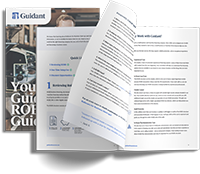LLC or Corporation? What about a Sole Proprietorship or a Partnership? What’s the difference between an S Corporation and a C Corporation? And what about B Corporations — what are those, again?
Entrepreneurs that start a small business know that one of the key components to its success lies in protection. Forming a legal entity for the business offers liability protection, but you might feel overwhelmed at all of the options if you don’t know the difference between all of the business structures available. Throughout the course of 2017, we’ve broken down the pros and cons of incorporating as certain entities here on the Guidant blog. Now, they’re rounded up for the ultimate listicle on how entrepreneurs can distinguish between the structures in order to determine which legal entity is the best fit for their business.
What Business Entity is Best for Me?
Limited Liability Company (LLC)
Easily one of the most recognizable entities, any entrepreneur who forms an LLC will rest assured that their professional and personal assets are kept separate with liability protection. Incorporating as an LLC means receiving additional incentives like tax benefits, establishing credibility with consumers, and the opportunity to pick your own tax entity — either as an S Corporation or a C Corporation — and continue to save on taxes.
Corporation
If you already know that one day you’ll want to expand your business and take it public, your best bet is to incorporate as a Corporation. Much like an LLC, you will be able to keep your assets separate from that of the business. Unlike an LLC, there are more formalities involved with forming a Corporation but it does set up a structure that makes it possible to accept money from investors and provide the issuance of stock in your business.
Sole Proprietorship
Going into business alone? Dreaming of being the only one to call the shots? You might want to form a sole proprietorship. The one caveat to keep in mind here is that as a sole proprietor, you will be held responsible for all aspects of the company. That includes a wide variety of areas ranging from being served with a lawsuit to loosing valuable customer information because a sole proprietorship doesn’t provide entrepreneurs with liability protection.
Partnership
Many entrepreneurs choose to go into business with their family or friends, which makes partnerships an attractive legal structure. This entity allows partners to make decisions and share profits and losses together. However, it’s important to note that the most successful partnerships are the ones that create and follow rules outlined in a partnership agreement. Don’t rush into a partnership without establishing this document first!
B Corporation
For those ‘treps that want to give back to business and society while still earning a profit, your best bet would be to incorporate as a for-profit B Corporation. For most entities, entrepreneurs only need to fill out applications and pay filing fees to get in business. B Corporations must first be certified in order to demonstrate how the business will commit to meeting standards of social and environmental performance, accountability, and transparency to benefit the public. The good news is that this is not as intense a process as it sounds with only a few performance and legal requirements needed before a B Corp can be properly certified.
S Corporation
As I mentioned earlier, LLCs can choose either an S Corp or C Corp as their tax entity. This is where the S Corporation entity is born, beginning as C Corps or LLCs that make them a C Corporation with an S Corp tax election. Because of that election, S Corps are not taxed as corporations but as partnerships to avoid double taxation. When an entity is taxed as a partnership, the corporation’s profits and losses are allowed to “pass through” the entity and be taxed at the shareholder level only. So what does all of this mean if you do decide to incorporate as an LLC and are taxed as an S Corp? The owner of the company may see self-employment taxes on salaries paid to them significantly reduced.
C Corporation
While S Corporations have the handy ability to pass profits and losses through an entity, C Corporations are a bit more structured. In this entity, profits are taxed separately from the owners of the business resulting in double taxation. Don’t get too alarmed about choosing this entity yet though! Despite double taxation, C Corps are able to claim more tax deductions and benefit write-offs than other entities. From tax season to the future of the business, C Corps also have the opportunity to raise capital for the business and take it public as well.
















